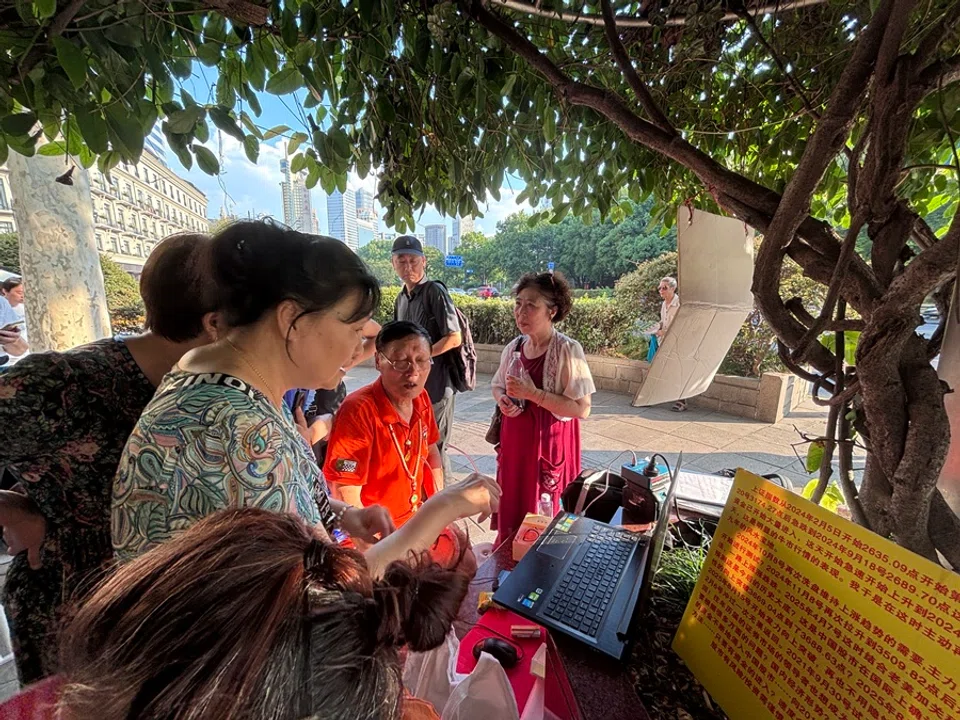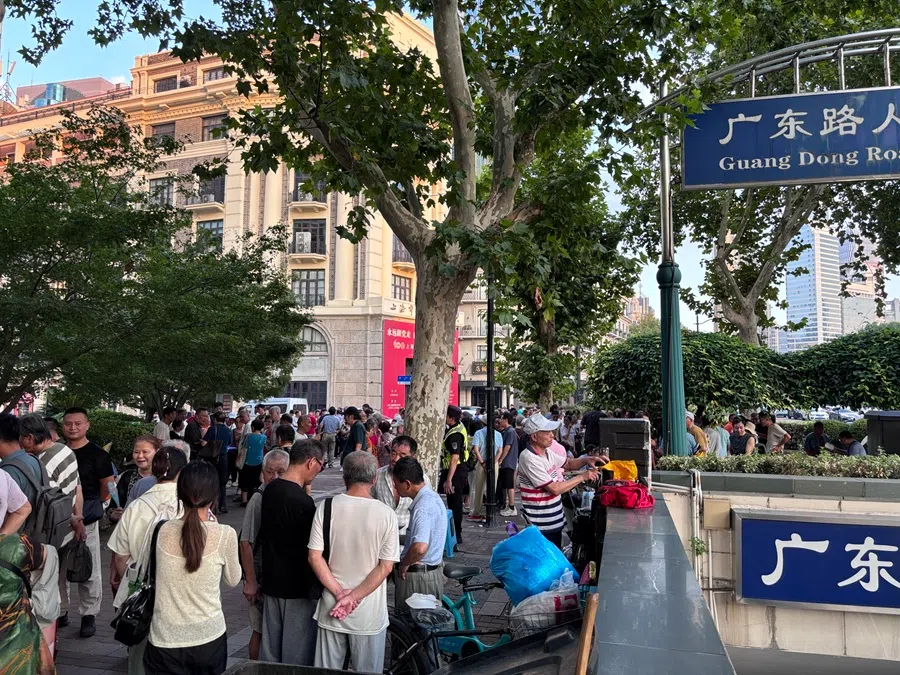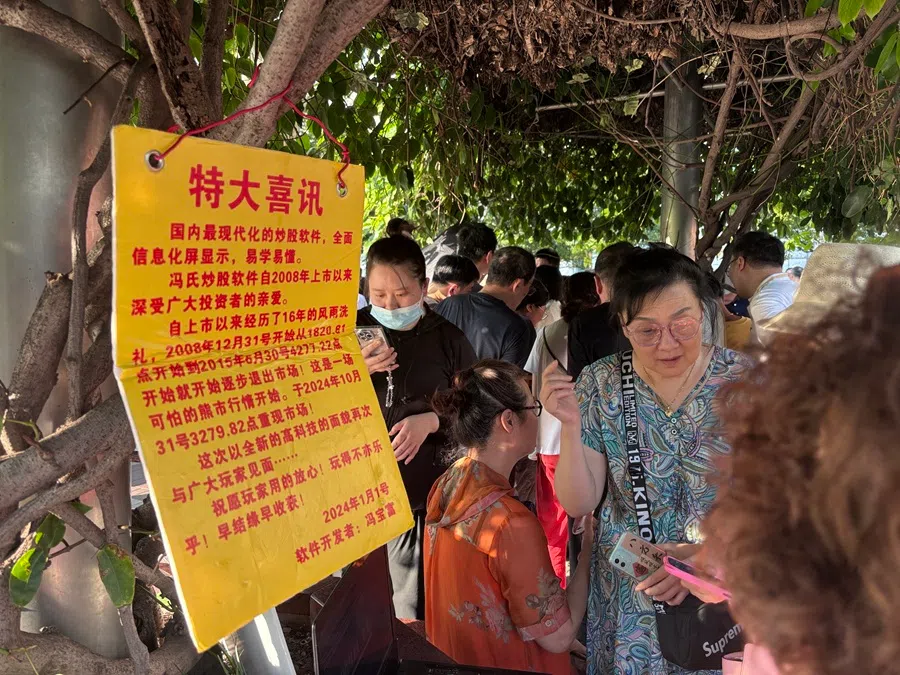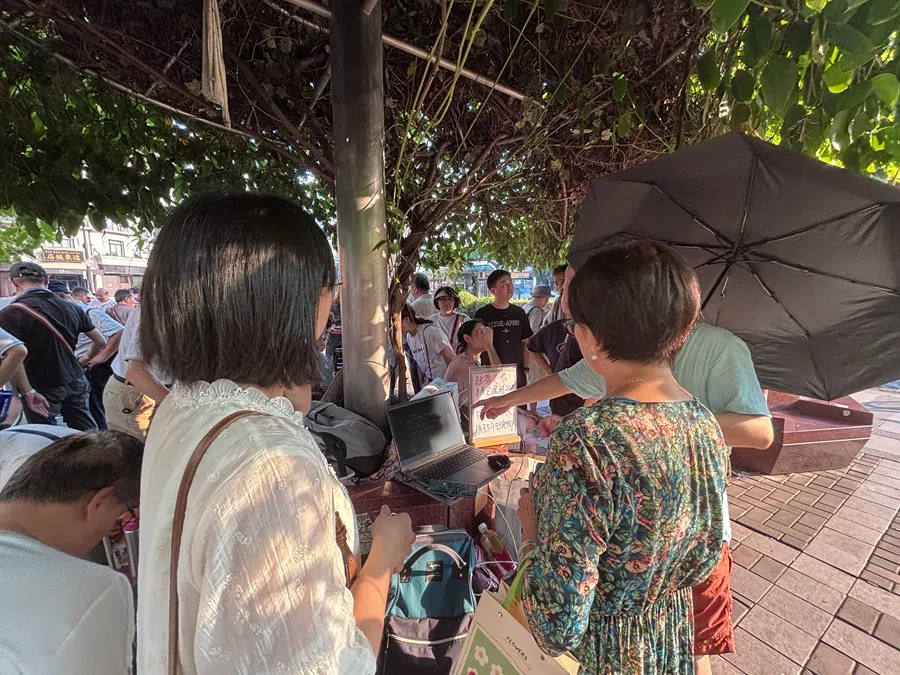Bull market fever: China’s street traders are back
The first weekend after the Shanghai Composite Index broke through 3,800 points, Shanghai’s unofficial “street stock salon” on Guangdong Road came alive with everyday stock traders. Lianhe Zaobao correspondent Li Kang took to the streets to find out more.

(Photos: Li Kang/SPH Media)
As soon as you step out from the pedestrian underpass on Guangdong Road, Shanghai, you are hit by the sweltering 38°C summer heat and the noisy chatter of everyday stock traders — some huddle in animated discussion, while others focus intently on their computers, listening to a “master” analyse K-line charts. No more than 200 square metres in size, the intersection is packed to the brim with investors.
It was 23 August, the first weekend after the Shanghai Composite Index broke through 3,800 points — a buzzing day at the city’s unofficial “street stock salon”.
Shanghai ‘grassroots financial centre’
Veteran Shanghai stock trader Feng Baofu sat under the shade of a tree with his laptop, answering questions from the crowd gathered around him. Beside him, a yellow cardboard sign showed his bold “declaration of confidence”: “This rally has solid foundations and momentum. Global capital is pouring into China’s stock market. Marching towards 5,178.19 points!”
Another line on the board reads: “The re-emergence of a bull market has brought me back to this ‘auspicious spot’ after nine years.”
Guangdong Road, a narrow street less than ten metres wide near People’s Square, is famously known as the city’s “grassroots financial centre”.

As early as the 1990s — before China’s A-share market was even launched — Shanghai’s first securities firm, Wanguo Securities, sat on this street. In the pre-internet era, local investors gathered here for informal “stock market salons”, sharing tips and insights. This grassroots tradition has continued for over three decades and continues to play out every weekend on Guangdong Road.
Taking notice of an unfamiliar face, he handed me a business card with his phone number and made a pitch: “2,000 RMB (US$279) a year. If you don’t know what to buy, I’ll guide you.”
The street’s last big moment occurred last October. A local uncle known as “Love in Late Autumn” (爱在深秋) gained viral fame after predicting the September market rally just as the Shanghai Composite dipped below 2,700 points. Someone in the crowd posted a video online, and the uncle went viral. But that rally was short-lived — it stalled around 3,500 points and entered a period of turbulence, until this recent breakout.
Compared with the cool caution of last autumn’s short bull run, Guangdong Road on 23 August was marked by a restless energy that easily outmatched the heat.
Curbside ‘experts’
Most of those seeking stock advice from Feng were familiar faces. He quickly types in the ticker symbols and within seconds gives his verdict to “sell” or “hold”. Taking notice of an unfamiliar face, he handed me a business card with his phone number and made a pitch: “2,000 RMB (US$279) a year. If you don’t know what to buy, I’ll guide you.”
Seeing my hesitation, he added reassuringly, “Just pay 1,000 RMB first. Once you make money, send me the other 1,000 RMB. It’s that simple. I’m not a scammer.”

Feng is not the only local uncle eager to preach the gospel of stock trading on Guangdong Road. An older trader with greying hair and wearing a baseball cap eagerly approached, pulled out his phone to log into a trading app, and proudly displayed his performance: a 911% cumulative return and an account balance nearing 1.8 million RMB.
“As long as you read the K-line correctly, you’re guaranteed to profit,” he asserted. “There are very few people on Guangdong Road who truly know how to read it.” — Mr Song, a young investor
A small crowd quickly gathered around. Beaming, he declared, “I haven’t met anyone on Guangdong Road with a higher return than mine. Follow my picks and your money will double next year!”
Another younger investor, Mr Song, took a more “theoretical” approach. He invited me to sit for a deeper conversation. Perched on the curb, he opened his trading app and launched into a 30-minute impromptu lesson on K-line theory.
Mr Song has been trading stocks for 20 years, growing his capital from 40,000 to 670,000 RMB. Speaking with conviction, he said that his strategy has nothing to do with bull or bear markets, the broader economy or macro policies. “As long as you read the K-line correctly, you’re guaranteed to profit,” he asserted. “There are very few people on Guangdong Road who truly know how to read it.”
Breaking even
Of course, Guangdong Road is also filled with the disappointed and frustrated. Li Zejun (pseudonym), a retired teacher with 30 years of stock trading experience, spoke with bitter frustration, warning against being tricked by the current bull run helping many break even. He scoffed, “Don’t be fooled — most of us old investors will go to our graves without ever breaking even!”
“... Why are so many people going in, but so few coming out? Look closer: some have lost an arm, some a leg, some even their heads. In the Chinese stock market, it’s far worse than just losing a piece of flesh.” — Li Zejun (pseudonym), a retired teacher with 30 years of stock trading experience

Launching into a 30-minute monologue tracing the origins of China’s stock market, he condemned it as “the root of all evil”, eventually offering a stark warning to the younger generation.
He said, “When you step into a meadow, look around first. Why are so many people going in, but so few coming out? Look closer: some have lost an arm, some a leg, some even their heads. In the Chinese stock market, it’s far worse than just losing a piece of flesh.”
This article was first published in Lianhe Zaobao as “时代涨跌之间 上海“股市沙龙”的旧面孔与新赌局”.





